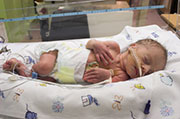- Double Mastectomy May Offer No Survival Benefit to Women With Breast Cancer
- Toxic Lead Found in Cinnamon Product, FDA Says
- Certain Abbott Blood Sugar Monitors May Give Incorrect Readings
- Athletes Can Expect High Ozone, Pollen Counts for Paris Olympics
- Fake Oxycontin Pills Widespread and Potentially Deadly: Report
- Shingles Vaccine Could Lower Dementia Risk
- Your Odds for Accidental Gun Death Rise Greatly in Certain States
- Kids From Poorer Families Less Likely to Survive Cancer
- Tough Workouts Won’t Trigger Cardiac Arrest in Folks With Long QT Syndrome
- At-Home Colon Cancer Test Can Save Lives
Preemies’ Woes Sometimes Due to Heredity, Study Says


WEDNESDAY, Sept. 25Only some of the physical and mental health problems previously associated with preterm birth are actually caused by it, a new study contends.
Researchers analyzed the medical records of 3.3 million children born in Sweden between 1973 and 2008, and confirmed the strong link between preterm birth (generally classified as before 37 weeks’ gestation) and the risk of infant and young adult death, autism and attention-deficit/hyperactivity disorder (ADHD).
However, the study authors also concluded that many other problems that have been linked with preterm birth — such as severe mental illness, learning problems, suicide and poverty — may instead be more closely related to other factors that people share with other family members.
“The study confirms the degree to which preterm birth is a major public health concern and strongly supports the need for social services that reduce the incidence of preterm birth,” study lead author Brian D’Onofrio, an associate professor in the department of psychological and brain sciences at Indiana University Bloomington, said in a university news release.
“Yet, the findings also suggest the need to extend services to all siblings in families with an offspring born preterm. In terms of policy, it means that the entire family, including all of the siblings, is at risk,” he added.
The study was published Sept. 25 in the journal JAMA Psychiatry. It is believed to be the largest population-based study of preterm births.
In some ways, the findings are consistent with previous studies and also highlight the risks of preterm birth. But previous studies compared preterm infants to unrelated full-term infants, while this study compared preterm infants with full-term siblings and cousins, an approach that shed new light on the issue.
“The study has given us insights that no other study has been able to do,” D’Onofrio said.
“Our study is part of a growing interest in research and public health initiatives focusing on very early risk,” he added. “When you look at early risk factors, they don’t just predict one type of problem; they frequently predict lots of problems with long-term implications.”
More information
The U.S. National Institute of Child Health and Human Development has more about preterm labor and birth.
Source: HealthDay
Copyright © 2024 HealthDay. All rights reserved.










